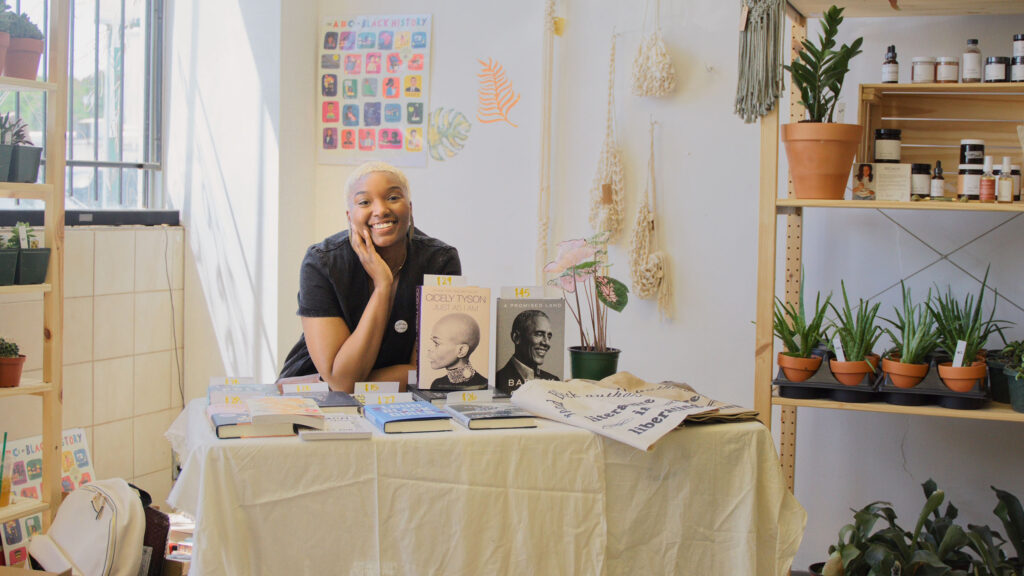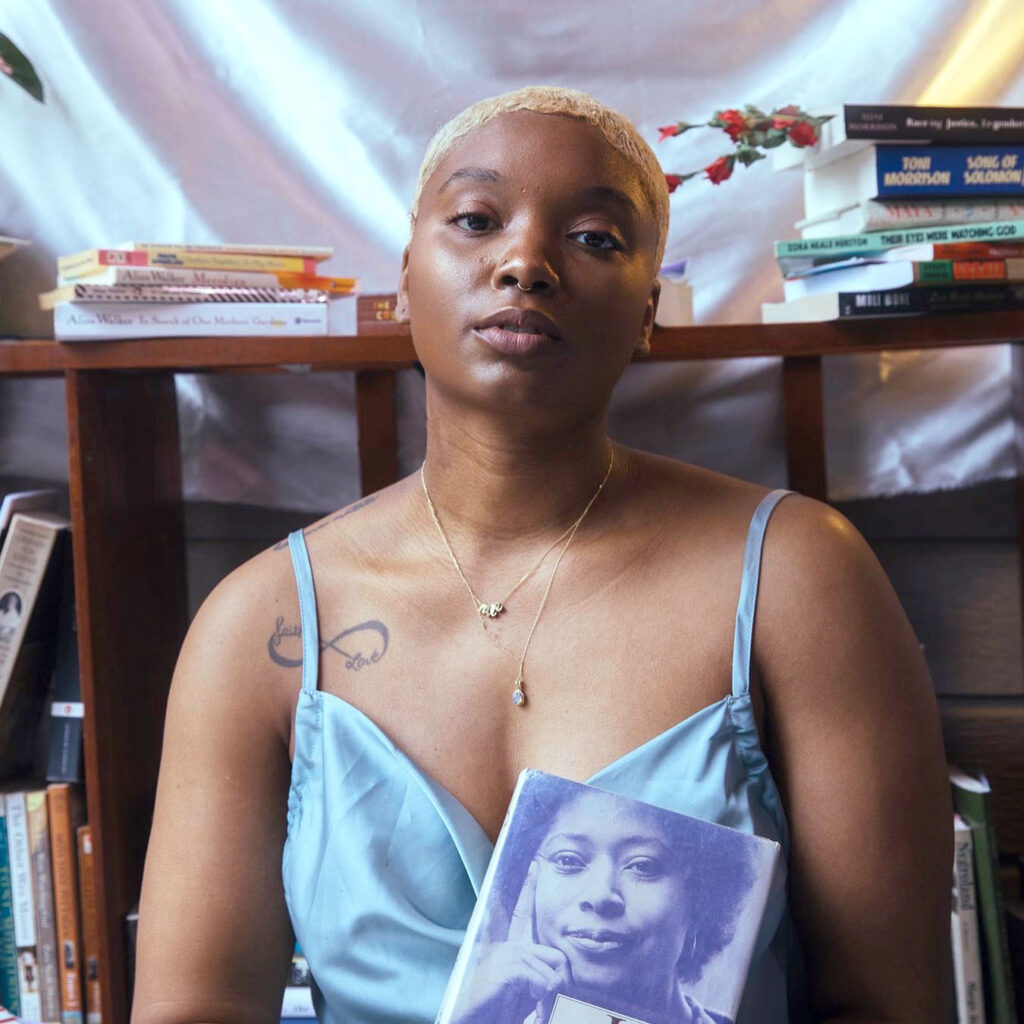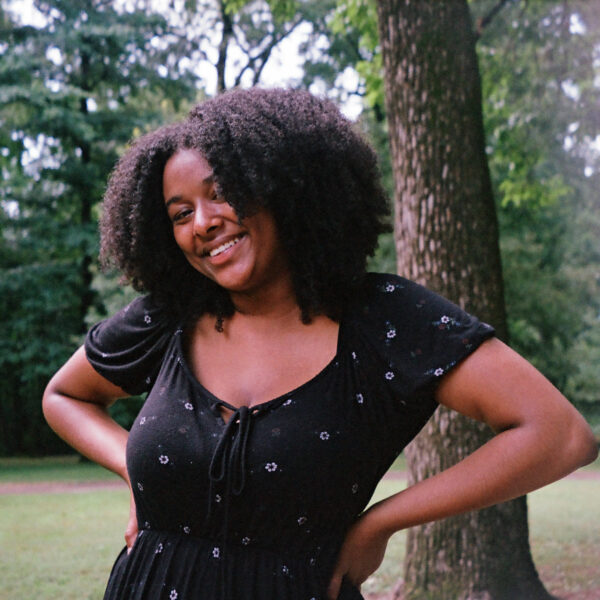I first met Jasmine Settles years ago, facilitating a youth poetry program at Hattiloo Theater called Write On, Speak Out. In my time here as a poet in this city, there have been so few literary spaces, and even fewer literary spaces that felt intrinsically Black; the circles were tiny. I remember being excited about the unfamiliar face. Here was a woman who was young, warm, and a brilliant poet. For want of a better phrase, I f*cked with her heavy.
It wasn’t long before that program dissolved, leaving yet another hole in our Black literary ecosystem. Others followed, and for a while it began to feel like there really were no spaces left. I would see Jasmine at events sometimes. I kept up with her on the internet and through her work with her arts organization HomeGrown, but I had no idea she was also the founder of Cafe Noir, a developing bookstore with a focus on BIPOC and LGBTQ+ writers.
Getting the chance to talk with her after so many years and so many life changes felt like a reunion.
NUBIA: I wanna start by asking, who is Jasmine Settles?
Jasmine: Hmmm, good question. I’m stumbling on this only because I recently just watched this video on Instagram that was like, “when I ask you who you are and you start describing actions, you do not know yourself.”
Um, who am I? I’m a writer. I’m somewhat of an environmentalist.
At this point, Jasmine’s son babbles in that sweet way that babies do.
Oh, welp, yeah, I’m a mother. Hi, son. I’m a wife. I don’t know. That question is hard. I don’t think I have a core identity other than being Black.
And what did your journey with literature look like?
Another good question. I started writing at a young age. I’ve always been a writer. My grandmother introduced me to books at a young age. I was reading Shakespeare. I visited a lot of theaters growing up, which I think also shaped my writing. I went to school, originally, to become a physical therapist. I was a student athlete through college. And once I graduated, I was like “oh, you know, basketball is basically over for me. What else can I do? Right? What else am I good at?” And I think that was the moment I was tryna answer the question you just asked. “Who am I? What am I supposed to be doing?” And so I mustered up the courage to go to graduate school for Literature and African American lit. I just realized I went to graduate school for the little girl who wanted to be a writer and an English teacher.
And since then, I think my relationship to writing has been about learning myself. And I’ve learned that writing takes a lot of reading. It takes a lot of reading to be a writer.

“I want this space to feel like you’ve walked into your grandmother’s kitchen. I want the cafe to feel like you’re sitting somewhere in France, but you’re not displaced. You’re exactly where you’re supposed to be. I want our shelves to be mirrors for our community.”
That’s a word. Because some folks really think they can write and not read.
Man, let me tell you something. On the Memphis poetry scene, I can tell. I can tell who ain’t been reading.
But, on the topic of reading, Cafe Noir is your brain child. How did that come to be?
2017, 2018, I walked into a graduate class that was taught by a Black woman who, to this day, I adore. And she introduced me to Octavia Butler. I was just sitting in the class. I had no clue what was going on. I felt so dumb and lost. I felt like I didn’t belong. But it was something about her introducing me to Octavia Butler that made me realize even more that there was so much discovery to happen. And folk who look like me, folk who are marginalized, folk who are pushed to the side deserve to experience these types of works sooner rather than later.
I felt like if I were given these works earlier in life, I would have been able to navigate things a little bit better. I would have felt seen; I would have known that these things that are happening to me, they have happened to someone else. I think that was the moment I was like I’m gonna open up a bookstore.
Jasmine’s son speaks to her again in his bright baby language.
I’m almost done, baby!
Um, yeah, and sitting there feeling dumb and ignorant. I know it’s so many folks who have been in that same position. At the time I was like ‘I’m trippin. I’m not equipped for this’ but looking back, I know there were so many folks feeling the same way. And they deserve to have more expansive works so that those moments aren’t so frequent. Those moments can be more few and far between because I may have experienced an entirely new world in this book by this author who looks just like me.
So as it stands right now, where are you with Cafe Noir, and where do you hope to be?
Right now, with me working full time and also doing all the other things I’m trying to do, I would say we are operating at maybe 10%, right? Cafe Noir is a beautiful site to log onto, or a page that might come across your feed. But I envision Cafe Noir being a physical
space that you walk into that feels like home. I want this space to feel like you’ve walked into your grandmother’s kitchen. I want the Cafe to feel like you’re sitting somewhere in France, but you’re not displaced. You’re exactly where you’re supposed to be. I want our shelves to be mirrors for our community. There are queer folks in our community. There are BIPOC folks in our community. And I want the shelves to reflect that. People deserve to see themselves. Representation is one of the greatest tools for reimagining one’s self.

What do you feel like Cafe Noir brings to the city that maybe didn’t exist before?
First off, I wanna say, Memphis is a Black a** city. Memphis has been Black. Memphis will always be Black. Black folks saved Memphis charters twice. And having a Black establishment in Memphis, ran by a Black woman, highlighting Black folk, highlighting POC folk, highlighting queer folk, it is essential to the community. Literature is essential to the community. Being a welcoming space, a peaceful space, is essential for the community. Other cities in the U.S have these spaces. And so I think that we should have that space.
Last question, how do you think little Jasmine who dreamed of being a writer and an English teacher would feel about the work you’re doing now?
I think little Jasmine would be very proud. I think she’d be very happy. As critical as big Jasmine is to herself, I think little Jasmine would say ‘wow, you did pretty good.’ Even if Cafe Noir doesn’t evolve into the space I hope for it to be, I still tried this. I think that counts for something. Little Jasmine was told being an English teacher doesn’t make any money. And I think I’ve proved them wrong for her. She may not teach English in a classroom at this moment, but she can still spread the love for literature.
You can follow all updates related to Cafe Noir on their instagram page @901Cafenoir. You can also see more of Jasmine and her work through her arts organization HomeGrown, @901homegrown.




